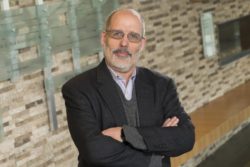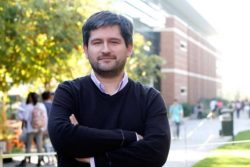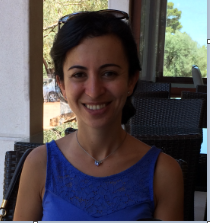CMC Online Seminar Series
The Choice Modelling Centre (CMC) is pleased to announce our third online seminar series. The seminars will cover all aspects of choice modelling and will be aimed at a cross-disciplinary audience. In general, there will be one seminar per week, on a Tuesday. With some exceptions, such as speakers from East Asia and Australia, the seminars will take place at 3pm UK time.
In this series, we are pleased to include three former CMC PhD students, thus giving you a flavour of the research undertaken at CMC itself.
Attending the seminars
Anyone who is interested is free to attend the online seminars.
To sign up for the seminars, please complete the form here.
Where possible, we will add recordings of the seminars in the ‘previous seminars’ section below.
Who is presenting?
We seek to be inclusive in our selection of speakers, covering all topic areas where choice modelling is used, and also giving opportunities to PhD students and early career researchers to present their work. Our only criteria for selecting speakers are the quality of the work and the likely appeal to the wider community of choice modellers.
We are also happy for those interested in giving a talk to approach us directly at cmc@leeds.ac.uk
Upcoming Seminars
Previous Seminars
Please note that the videos below will work best if you either use the pop out option or download the video.
[17-08-2021] Timothy Braithwaite. Putting the 'I' back in choIce modelling: Motivations and desiridata for individualized choice models.

Timothy Braithwaite
Putting the 'I' back in choIce modelling: Motivations and desiridata for individualized choice models.
17th August, 3-4pm
Abstract: This talk is about "Putting the 'I' back in choIce modelling: Motivations and desiridata for individualized choice models." We will investigate why choice modellers might want to turn our modeling efforts inwards to build models with N=1, how we might do it successfully, and what we can do with such research afterwards.
About: Dr. Timothy Brathwaite is a data scientist. He's most recently worked with Stitch Fix, Inc. and Lyft. Inc. His research, in the Ph.D and currently, focuses on the intersection between machine learning, statistics, and discrete choice.
He was the recipient of the 2018 Eric Paz dissertation award from the International Association for Travel Behavior Research for his work on these topics.
[10-08-2021] Andrew Bwambale (Makerere University) Developing travel behaviour models using mobile phone data.
 Andrew Bwambale
Andrew Bwambale
Developing travel behaviour models using mobile phone data.
Tuesday 10th August, 2-3pm
[03-08-2021] David Bunch (University of California, Davis) Efficient and reliable numerical methods for optimization-based model estimation and inference.
Part 1
Part 2
Download video (part 1)
Download video (part 2)
 David S. Bunch (University of California, Davis)
David S. Bunch (University of California, Davis)
Efficient and reliable numerical methods for optimization-based model estimation and inference.
Tuesday 3rd August, 4-5pm
Abstract: For context, we consider the case of estimating discrete choice models (or, perhaps related models such as integrated choice and latent variable models) using maximum likelihood. Obtaining these estimates requires solving a nonlinear optimization problem that is relatively difficult for all but the simplest models (e.g., multinomial logit). The vast majority of choice modeling researchers rely on estimation software created by others, e.g., commercial packages such as LIMDEP or Stata, or “freeware” such as BIOGEME or, more recently, Apollo. Generally speaking, all of these rely on general-purpose optimization methods that employ Hessian approximations based on secant updates (e.g., BFGS). This talk provides an overview of this topic, and introduces an approach for estimating models with many fewer iterations. The method is currently being integrated into Apollo.
About: David Bunch is professor of management at University of California, Davis, where he has been affiliated with the Institute of Transportation Studies since its inception. He earned his Ph.D. and M.S. in mathematical sciences and M.S. from Rice University. His research covers many aspects of discrete choice modeling, both methodological and in empirical applications to public policy issues related to vehicle choice and travel demand.
[27-07-2021] Guy Hawkins (University of Newcastle, Australia) Time impacts preferential choices.

Guy Hawkins (University of Newcastle, Australia)
Time impacts preferential choices
Tuesday 27th July
Abstract: It is well known that the time course of decisions reliably impacts decision outcomes in studies of speeded decision making. Through the lens of experimental studies and computational modelling, this presentation provides illustrative case studies of the different ways in which time also plays an important role in how we make preferential decisions. These studies suggest that psychologically motivated theoretical frameworks that predict decision outcomes and decision times may provide a novel and fruitful avenue for the study of preferences.
About: Guy Hawkins is a cognitive psychologist and ARC DECRA alumnus at the University of Newcastle, Australia. His research investigates how people make different types of decisions. In most of his work, he combines techniques from experimental psychology, behavioural economics, and quantitative methods.
[13-07-2021] Nicola Ortelli (EPFL) Assisted specification of discrete choice models

Assisted specification of discrete choice models
Tuesday 13th July, 3-4pm
Abstract: Determining appropriate utility specifications for discrete choice models is time-consuming and prone to errors. With the availability of ever larger datasets, interest has recently emerged for methods that are able to mitigate the need for presumptive structural assumptions. While the majority of these methods make use of well-known machine learning techniques, this seminar presents an alternative framework, based on combinatorial optimization and metaheuristic procedures. Its advantages and limitations are discussed.
About: Nicola Ortelli is a research and teaching assistant at the School of Management and Engineering Vaud (HEIG-VD) and a PhD student in the Transportation and Mobility Laboratory (TRANSP-OR) at École Polytechnique Fédérale de Lausanne (EPFL). His research interests are in the areas of discrete choice modeling, machine learning, optimization and their intersections.
[06-07-2021] Esther de Bekker-Grob (Erasmus University Rotterdam) Towards Accurate Prediction of Choice Behaviour in Health Care

Esther de Bekker-Grob (Erasmus University Rotterdam)
Towards Accurate Prediction of Choice Behaviour in Health Care
Tuesday 6th July, 3-4pm
Abstract: Health care is under heavy pressure due to rising expenditures, an ageing population, high prices of new medical treatment options, and a substantial resource waste every year. Accurate prediction of patients’ choice behaviour enables better decisions in health care by avoiding poor policy decisions, trial-and-error implementation and demand-supply imbalance. This research project determined – using a mixed methods design and different medical areas - how well the preferences that patients said they have correspond to what they actually chose, why they deviated, and how choice behaviour in health care can be better predicted.
About: Esther de Bekker-Grob is a Full Professor of Health Economics & Health Preferences at the Erasmus School of Health Policy & Management of the Erasmus University Rotterdam, the Netherlands. In addition, she is director at the (i) interfaculty Erasmus Choice Modelling Centre; (ii) International Academy of Health Preference Research, and (iii) TU Delft – Erasmus University convergence ‘Health Policy Evaluation lab’. Her fundamental and applied research yielded insights that are valuable for decision-making in health care, at both a macro and micro level. She strives to achieve optimal health care decisions by promoting efficient and sensible spending in both the prevention, cure and care domains.
[29-06-2021] Petr Mariel (University of the Basque Country) Simulation based method for identification of non-trading and lexicographic behaviour in stated choice studies

Petr Mariel (University of the Basque Country)
Simulation based method for identification of non-trading and lexicographic behaviour in stated choice studies.
Tuesday 29th June, 3-4pm
Abstract: We propose a procedure to test the difference between the expected and the observed number of specific choice patterns in a stated preference data. This procedure can be useful to identify patterns produced by lexicographic or non-trading behaviour. We use a simulation study to show in which cases the power of the test is expected to be high. Finally, we apply the proposed test to an environmental valuation dataset collected in South Delhi, aimed at collecting individuals’ preferences for air quality improvement.
About: Petr Mariel is an associate professor at the Department of Quantitative Methods of the University of the Basque Country UPV/EHU (Bilbao, Spain). His research focus is centred on discrete choice modelling applied mainly to environmental valuation, but he has also worked in the field of health, public and urban economics.
[22-06-2021] Fangqing Song (UCL) Understanding mode choice behaviour when new modes come into play

Fangqing Song (UCL)
Understanding mode choice behaviour when new modes come into play
Tuesday 22nd June, 3-4pm
Abstract: Stated choice (SC) experiment has been widely used in the transport realm to capture individuals' preferences, whereas best-worst scaling (BWS) method is popular outside of transport. In this study, SC data and BWS data were linked via the notion of attribute importance and jointly estimated to improve the understanding of mode choices and preference heterogeneity in the context of high-speed-rail (HSR)- air intermodality. Other models were also developed to explore the impact of variety-seeking on mode choice behaviour when another new mode, i.e. air taxi, is introduced.
About: Fangqing is a postdoctoral research fellow at University College London and a former PhD student at University of Leeds. Her research interests lie in discrete choice modelling and experimental design. She mainly works in the field of new mobility, but is also interested in health. She is currently working on the public acceptance of green aircraft and mobility tool ownership modelling.
[15-06-2021] Andreia Martinho (TU Delft) An empirical approach to capture moral uncertainty in AI

Andreia Martinho (TU Delft)
An empirical approach to capture moral uncertainty in AI
Tuesday 15th June, 3-4pm
Abstract: Choice modeling is traditionally used to analyze and predict the choice behaviour of humans. We propose a novel way to apply such models, which is to equip an Artificial Intelligence with a moral compass. Specifically, we show how the theoretical concept of moral uncertainty – a cornerstone of machine ethics – can be effectively operationalized using latent class choice models.
About: Andreia Martinho is a PhD candidate in the ERC-BEHAVE research group of PI Caspar Chorus at Delft University of Technology. Prior to coming to The Netherlands she did her master’s degree in NYU on a Fulbright scholarship. She is interested in empirical research within the domain of Artificial Intelligence and Ethics.
[08-06-2021] Evangelos Paschalidis (University of Leeds) Developing driving behaviour models incorporating the effects of stress
Evangelos Paschalidis (University of Leeds)
Developing driving behaviour models incorporating the effects of stress
Tuesday 8th June, 3-4pm
 Abstract: Models used in microscopic simulation are mostly approximating driving behaviour as a function of the surrounding traffic conditions, without considering drivers’ individual characteristics. In this talk a series of traditional driving behaviour models (car-following and gap-acceptance) is presented, that incorporate the effect of drivers’ stress and other individual characteristics. The models were estimated with econometrics techniques using data collected at the University of Leeds Driving Simulator (UoLDS), while stress levels were measured via physiological responses as heart rate and skin conductance. Issues of transferability between driving simulator and field traffic are also discussed.
Abstract: Models used in microscopic simulation are mostly approximating driving behaviour as a function of the surrounding traffic conditions, without considering drivers’ individual characteristics. In this talk a series of traditional driving behaviour models (car-following and gap-acceptance) is presented, that incorporate the effect of drivers’ stress and other individual characteristics. The models were estimated with econometrics techniques using data collected at the University of Leeds Driving Simulator (UoLDS), while stress levels were measured via physiological responses as heart rate and skin conductance. Issues of transferability between driving simulator and field traffic are also discussed.
About: Evangelos Paschalidis is a Research Fellow at the Institute for Transport Studies, University of Leeds. He is currently working on the EU funded project PAsCAL that focuses on the public acceptance of autonomous vehicles. His main research interests are in the areas driving behaviour modelling, human factors and autonomous vehicles.
[15-12-2020] Kara Kockelman (UT Austin), Krishna Murthy Gurumurthy (UT Austin) and Prateek Bansal (Imperial). Modelling Animal-Vehicle Collision Counts Across Large Networks using a Bayesian Hierarchical Model.



Kara Kockelman (UT Austin), Krishna Murthy Gurumurthy (UT Austin) and Prateek Bansal (Imperial)
Modelling Animal-Vehicle Collision Counts Across Large Networks using a Bayesian Hierarchical Model.
Tuesday 15th December, 3-4pm
Abstract: Animal-vehicle collisions (AVCs) are common around the world and result in considerable loss of animal and human life, as well as significant property damage and regular insurance claims. Understanding their occurrence in relation to various contributing factors and being able to identify locations of high risk are valuable to AVC prevention, yielding economic, social, and environmental cost savings. A hierarchical Bayesian model with the Dirichlet process is developed to use AVC data across about 120,000 segments of state-controlled highways in Texas, U.S. This enables policy-making by identifying high-risk locations, inferring key contributing geometric factors, and accounting for seasonality in animal crossings.
About:
Kara Kockelman is a Professor of Transporation Engineering at The University of Texas at Austen. She has co-authored 170 publications across numerous topics including self-driving, automated & connected vehicles, energy & greenhouse gas emissions, travel demand modelling and traffic safety.
Krishna Murthy Gurumurthy is a doctoral candidate in transportation engineering at The University of Texas at Austin with a master's in civil engineering and another in statistics, and is interested in travel demand modeling & forecasting.
Prateek Bansal is a Leverhulme Trust Early Career Fellow at Imperial College London, who is interested in developing methods at the intersection of Bayesian machine learning and econometrics to improve the understanding of travel behaviour and safety.
[08-12-2020] Milad Haghani (University of Sydney) Hypothetical bias in stated choice experiments
 Milad Haghani (University of Sydney)
Milad Haghani (University of Sydney)
Hypothetical bias in stated choice experiments
Tuesday 8th December, 11am-12pm
Abstract: We revisit the notion of hypothetical bias in choice experiment. This includes (i) the prevalence of bias across various choice contexts, (ii) the established sources/explanations of this bias, (iii) the effectiveness of its mitigation strategies and (iv) how behavioural sciences can help us better understand it. We also demonstrate an empirical investigation of this bias in an under-explored context, where choices do not entail monetary trade-offs.
About: Dr Milad Haghani is a Research Fellow at the Institute of Transport and Logistics Studies (ITLS), University of Sydney Business School. He has made pioneering applications of econometric choice methods in modelling pedestrian and evacuation behaviour.
[01-12-2020] Maya Abou Zeid (American University of Beirut) Analyzing Distraction while Driving using Driving Simulation, Physiological Sensors, and Eye Tracking.
Maya Abou Zeid (American University of Beirut)
Analyzing Distraction while Driving using Driving Simulation, Physiological Sensors, and Eye Tracking.
Tuesday 1st December, 3-4pm
Abstract: In this talk, I will describe two studies of driving distraction, in the form of auditory-vocal mental workload and browsing social media, which we conducted in a driving simulation laboratory at the American University of Beirut. We assessed the impacts on driving performance and attention using statistical analysis and behavior modeling. I will discuss the policy and technology implications of findings from these studies for enhancing road safety.
About: Maya Abou Zeid is an Associate Professor of Civil and Environmental Engineering at the American University of Beirut. Her research and professional interests are in the areas of travel behavior modeling and forecasting, urban transportation planning, and driving behavior and road safety.
[24-11-2020] Brett Smith (University of Western Australia) Consumer app-etite for workers’ rights in the Australian platform economy
 Brett Smith (University of Western Australia)
Brett Smith (University of Western Australia)
Consumer app-etite for workers’ rights in the Australian platform economy
Tuesday 24th November, 11am-12pm
Abstract: The emergence of the ‘gig’ economy is disrupting industries, reshaping the organisation of work and, in many cases, undermining the terms and conditions under which work is carried out. This study explores the attitudes towards, understandings of and willingness to pay for conditions and entitlements in app-based food-delivery services.
About: Brett is a research fellow in the Centre of Business Data Analytics, UWA, and an associate with the Planning and Transport Research Centre, WA. By way of his interest in travel behaviour, Brett has applied choice modelling to a number of domains including industrial relations and acceptance of future technologies in the workplace.
[17-11-2020] Melvin Wong (EPFL) Demystifying out-of-sample discrete choice prediction: What can we learn from machine learning?
 Melvin Wong (EPFL)
Melvin Wong (EPFL)
Demystifying out-of-sample discrete choice prediction: What can we learn from machine learning?
Tuesday 17th November, 3-4pm
Abstract: Out-of-sample (OOS) prediction is the cornerstone of both discrete choice and machine learning. However the two fields take very different approaches to improving model performance on unseen data. This seminar identifies the best practices, pitfalls and methodological developments of each field for OOS prediction, and how we can learn from each other.
About: Melvin Wong is a post-doctoral researcher in the Transport and Mobility Laboratory (TRANSP-OR) at École polytechnique fédérale de Lausanne (EPFL). His research focuses on deep learning optimization, travel behaviour, and novel applications of machine learning to choice models. He is a recipient of the Swiss Government Excellence Scholarship for post-doctoral research.
[03-11-2020] Angelo Guevara (Universidad de Chile) A methodological framework to incorporate psychophysiological indicators into transportation.

Angelo Guevara (Universidad de Chile)
A methodological framework to incorporate psychophysiological indicators into transportation.
Tuesday 3rd November, 3-4pm
Abstract: This research puts forward, illustrates and tests a methodological framework to incorporate psychophysiological indicators gathered from biosensors into transportation choice behavioral modeling. The framework is tested by means of Monte Carlo analysis and a prototype experiment in which a public transport user travelled wearing a bracelet with a Printed Circuit Board that integrated tiny biosensors.
About: Angelo Guevara holds a MSc in transportation from UChile, as well as a MSc and a PhD in the same area from MIT. His main research interests are in modeling of choice behavior. He is associate professor at Universidad de Chile (UChile), researcher at ISCI (UChile) and affiliated to ITS (MIT) and CMC (University of Leeds).
[22-09-2020] Michael Maness (University of South Florida) Can my activity choices be explained through what my friends offer? Exploring a Social Capital Theory of leisure activity.
 Michael Maness (University of South Florida)
Michael Maness (University of South Florida)
Can my activity choices be explained through what my friends offer? Exploring a Social Capital Theory of leisure activity.
NEW DATE: Tuesday 22nd September, 3-4pm (UK time)
Abstract: In this presentation, two hypotheses are explored: (1) social capital is an integral determinant of leisure activity participation and (2) having access to instrumental social resources promotes instrumental outcomes demonstrated by increased leisure activity variety. Using indicators from both a position generator and resource generator, we find support for the influence of social capital in leisure activity behavior using a web-based survey of activity behavior. As social capital has distinct impacts even among homogeneous groups, we propose that choice modelers can derive insights from social capital measures to build more socially and behaviorally realistic models.
About: Michael Maness is an assistant professor of Civil and Environmental Engineering at the University of South Florida. His research programs centers on exploring the social sustainability and social resilience of technical systems by incorporating social interactions into behavioral modeling. Dr. Maness was awarded the 2015 Eric Pas Dissertation Prize and he has published research in leading transportation journals on advanced choice models with applications to car ownership, managed lanes, cycling behavior, activity behavior, and communication behavior.
[15-09-2020] Akshay Vij (University of South Australia) Modelling the dynamics of preference change
 Akshay Vij (University of South Australia)
Akshay Vij (University of South Australia)
Modelling the dynamics of preference change
Tuesday 15th September, 11am-12pm (UK time)
Abstract: Choice models have traditionally assumed that individual preferences are inherently stable over time. The transformative nature of recent global events calls this assumption into serious question. This talk discusses how to repurpose commonly available datasets and econometric frameworks to explicitly model the dynamics of preference change.
About: Dr. Akshay Vij is a senior research fellow at the Institute for Choice, University of South Australia. He has previously worked as lecturer and post-doctoral scholar at the University of California (UC), Berkeley, with joint research appointments at the Institute of Transportation Studies and the Institute of Urban and Regional Development. He received his Ph.D. in Civil and Environmental Engineering, also from UC, Berkeley.
[08-09-2020] Abdul R. Pinjari (Indian Institute of Science) Choice Models with Stochastic Variables and Random Coefficients.

Abdul R. Pinjari (Indian Institute of Science)
Choice Models with Stochastic Variables and Random Coefficients.
Tuesday 8th September, 3-4pm (UK time)
Abstract: This talk will examine the use of the integrated choice and latent variable (ICLV) framework for identifying utility functions with stochastic variables and random coefficients on those variables. The framework is applied to formulate a joint model of travel time and route choice, where travel time is treated as inherently stochastic and travelers’ sensitivity to time is heterogeneous. It is shown that a model that neglects stochasticity in travel time results in a downward bias in the mean and variance of sensitivity to travel time.
About: Abdul Rawoof Pinjari is an Associate Professor in Civil Engineering and Chairman of the Centre for infrastructure, Sustainable Transportation and Urban Planning (CiSTUP) at the Indian Institute of Science. His research is in mathematical modelling of human choice (consumer) behaviour in infrastructure service systems, particularly in transportation systems. He is currently Vice Chair of the International Association for Travel Behaviour Research (IATBR), an Associate Editor of Transportation Research Part B, and serves on the editorial boards of Journal of Choice Modelling, Transportation, and Transportation in Developing Economies.
[01-09-2020] Emma Frejinger (Université de Montréal) Discrete Choice Meets Discrete Optimization
 Emma Frejinger (Université de Montréal)
Emma Frejinger (Université de Montréal)
Discrete Choice Meets Discrete Optimization
Tuesday 1st September, 3-4pm (UK time)
Abstract: One important goal with choice modelling is to use the models or the resulting predictions to solve decision-making problems. A prominent example is transport network design where a central authority makes design decisions (e.g., modifying infrastructure) and users react to those decisions by possibly changing their behaviour (e.g., route choice). This can be formulated as a bilevel optimization problem. In this talk we provide background on so-called recursive route choice models and show how they can be integrated in a bilevel formulation that allows for an effective solution approach.
About: Emma Frejinger is Associate Professor at the Department of Computer Science and Operations Research at Université de Montréal. She is the holder of the Canada Research Chair in Demand Forecasting and Optimization of Transport Systems, and the holder of the CN Chair in Optimization of Railway Operations. Most of her ongoing research activities are at the intersection between statistical learning and operations research. She is a member of CIRRELT, an associate member of Mila, and she works part-time as scientific advisor for IVADO Labs.
[25-08-2020] Abisai Konstantinus (CEO, Ndatara) Using choice modelling to inform maritime transport development in Southern Africa.
 Abisai Konstantinus (CEO, Ndatara)
Abisai Konstantinus (CEO, Ndatara)
Using choice modelling to inform maritime transport development in Southern Africa.
Tuesday 25th August, 3-4pm (UK time)
Abstract: In a research project aimed to assess the viability of short-sea shipping in South Africa, seven different choice models were developed. Each of those models addressed different research objectives. What the study revealed is the suitability of choice modelling to studies on maritime transport development in Africa.
About: Dr. Abisai Konstantinus is the CEO of Ndatara, an applied research and consultancy firm based in Swakopmund Namibia (www.ndatara.com). Abisai has 16 years combined experience in the maritime industry spent as officer on ocean-going ships and as a marine pilot in Namibia (Walvis Bay and Lüderitz). He holds a NDip: Maritime Studies (CPUT), PQE: ICS (UK), MPhil: Shipping Law (UCT), MSc: Shipping Management and Logistics (WMU), PhD Transport Engineering (UCT).
[18-08-2020] Julian Arellana (University Del Norte) Choice experiments using virtual reality: some lessons compared to traditional text and image experiments.
 Julian Arellana (University Del Norte)
Julian Arellana (University Del Norte)
Choice experiments using virtual reality: some lessons compared to traditional text and image experiments.
Tuesday 18th August, 3-4pm (UK time)
Abstract: This talk will describe some benefits and drawbacks of using Virtual Reality (VR) for choice experiments. Models estimated using VR data will be compared to models estimated from data collected by traditional text and image surveys, considering two contexts to study pedestrian behaviour.
About: Julian obtained his PhD degree from the Pontifical Catholic University of Chile. He currently works as Associate Professor and Director of Research and Graduate programs in Engineering at University del Norte in Barranquilla, Colombia. His research interests include transport modelling, sustainable transport planning in the Global South, and the novel application of choice experiments.
[04-08-2020] John Buckell (University of Oxford) Smokers’ choices and addiction: a hybrid choice model approach in the US.

John Buckell (University of Oxford)
Smokers’ choices and addiction: a hybrid choice model approach in the US.
(with Professor David Hensher and Professor Stephane Hess)
Tuesday 4th August, 3-4pm (UK time)
Abstract: We use a hybrid choice model, with a latent variable capturing addiction, to study US smokers’ cigarette/e-cigarette choices. We estimate how product and nicotine preferences vary by addiction, and addiction’s impact on the US government’s proposed lowering of nicotine in cigarettes.
About: I’m a senior researcher at the Health Economics Research Centre (Nuffield Dept of Population Health) and Health Behaviours (Nuffield Dept of Primary Care Health Sciences), University of Oxford. I use experiments and secondary data to study health behaviours in tobacco, obesity, and genomics.
[28-07-2020] Adele Diederich (Jacobs University) Parallel or sequential? Modelling decision making for multiattribute alternatives.
 Adele Diederich (Jacobs University)
Adele Diederich (Jacobs University)
Parallel or sequential? Modelling decision making for multiattribute alternatives.
Tuesday 28th July, 3-4pm (UK time)
Abstract: Dynamic stochastic models for decision making account for choice frequencies and decision times. However, almost all models assume that information of attributes is collapsed prior to preference accumulation. Here I propose a non-time homogeneous framework that treats the processing of attributes separately.
About: Professor of Psychology.
PhD 1991 – Purdue University and Hamburg University. Habilitation 1995 – Oldenburg University.
Chief editor of Journal of Mathematical Psychology.
[21-07-2020] Bilal Farooq (Ryerson University) Generative machine learning for discrete-continuous choice data.
Download video
Download slides
Bilal Farooq (Ryerson University)
Generative machine learning for discrete-continuous choice data.
Tuesday 21st July, 3-4pm (UK time)
Abstract: We propose a plausible perspective to exploit the use of generative machine learning techniques for modelling the underlying heterogeneities in large-scale discrete-continuous (MDC) choice data. For interpretability, the conditional probabilities and elasticities are derived as well as statistical analysis on the latent construct is performed. An application on GPS based travel data indicates that the model can generate statistically similar distributions in forecasting and performs better than purely discriminative models.
About: Bilal Farooq is Canada Research Chair in Disruptive Transportation Technologies and Services. He is currently an Associate Professor in Transportation Engineering at Ryerson University, Canada and the Director of Laboratory of Innovations in Transportation (LiTrans). He has received Early Researcher Awards in Québec (2014) and Ontario (2018), Canada.
[14-07-2020] Aruna Sivakumar (Imperial College, London) Modelling the effect of social influence on choice behaviour
Download video
Download slides
 Aruna Sivakumar (Imperial College, London)
Aruna Sivakumar (Imperial College, London)
Modelling the effect of social influence on choice behaviour
Tuesday 14th July, 3-4pm (UK time)
Abstract: I present two empirical case studies involving the estimation of choice models for the adoption of a new transport technology/service. The first case study explores the role of peer attitudes in the individual's intent to purchase an electric vehicle; while the second case study analyses the individual's intent to use a pro-environmental transport mode (bike-sharing) within a cohort of students. Through these case studies the talk will identify several insights and guidelines for the inclusion of social influence within choice models.
Bio: Aruna Sivakumar is a senior lecturer in consumer behaviour and urban systems at the Centre for Transport Studies, Imperial College London. She is also director of the Urban Systems Lab, and leads several smart city and systems modelling initiatives. Her research is focused on the mathematical and statistical modelling of behaviour and demand especially as it relates to mobility and resource (energy) consumption.
[07-07-2020] Michiel Bliemer (University of Sydney) Risk and uncertainty in choice experiments using simulated experiences.
Download video
Download slides
 Michiel Bliemer (University of Sydney)
Michiel Bliemer (University of Sydney)
Risk and uncertainty in choice experiments using simulated experiences.
Tuesday 7th July, 1-2pm (UK time)
Abstract: Including risky and uncertain attributes into a choice experiment is challenging because respondents may find them difficult to understand and imagine. In this seminar, the focus is on route choice experiments with three levels of travel time unreliability, namely risky, uncertain, and endogenous travel times. In each experiment, respondents experience travel times by driving in quasi-naturalistic driving simulators in the Travel Choice Simulation Laboratory (TRACSLab).
About: Michiel Bliemer is Professor of Transport Planning and Modelling at the Institute of Transport and Logistics Studies at the University of Sydney Business School, and an external affiliate of the Choice Modelling Centre in Leeds. Michiel has made significant contributions to the literature in the areas of discrete choice modelling and stated choice experimental design as well as network modelling and traffic assignment. Michiel is one of the co-developers of the Ngene experimental design software and active in answering any stated choice experiment questions on the ChoiceMetrics forum.
[30-06-2020] Jette Bredahl Jacobsen (University of Copenhagen) Will farmers shoot the wolf?
Download video
Download slides
 Jette Bredahl Jacobsen (University of Copenhagen)
Jette Bredahl Jacobsen (University of Copenhagen)
Will farmers shoot the wolf?
Tuesday 30th June, 3-4pm (UK time)
Abstract: The wolf recently immigrated to Denmark after more than 200 years of absence. While protected by law, the question was how farmers would react. We conducted a CE and let them express preferences for illegal actions by “hiding” it in bundles (alternatives) of also legal activities. Now, a couple of years later, we can relate it to what actions they actually did.
About: Jette Bredahl Jacobsen is professor at University of Copenhagen in environmental and resource economics, working with a broad range of topics and methods within this field. Her interest in choice modelling is to use it as a tool to learn about preferences the goods being investigated. She has a particular interest in valuation of non-use values (e.g. biodiversity), but also works with environmental use values (e.g. outdoor recreation)
[23-06-2020] Cinzia Cirillo (University of Maryland). A decade of research on vehicle ownership and use: methods, results and impacts on U.S. policy making.
Download video
Download slides

Cinzia Cirillo (University of Maryland)
A decade of research on vehicle ownership and use: methods, results and impacts on U.S. policy making.
Tuesday 23rd June, 3-4pm (UK time)
Abstract: The seminar will give an overview of methodological advances for vehicle ownership and use modeling, and presents empirical results obtained on US data. A dynamic model formulation for new vehicle technology adoption will be presented and its integration with continuous variables for the prediction of Vehicle Miles Travelled will be briefly introduced. Estimates of rebound effect and elasticity to fuel cost will be discussed in the light of the 2018 Notice of Proposed Rulemaking (NPRM) issued by EPA and NHTSA.
About: Cinzia Cirillo is a Full Professor at the University of Maryland (USA), Department of Civil and Environmental Engineering. She has been an active member of the travel behavior community for about two decades. Her work has focused on the fundamentals of the disciplines: discrete choice analysis, survey methodologies including national travel surveys and stated preference, and activity based modeling.
[02-06-2020] Shenhao Wang, MIT. Deep Neural Networks for Choice Analysis
Dr. Shenhao Wang, Massachusetts Institute of Technology
Deep Neural Networks for Choice Analysis
Abstract: There exists a tension between the classical travel behavioral models and the new machine learning (ML) classifiers. While many studies have shown that ML classifiers can outperform choice models for prediction, this presentation discusses how to generate mutual benefits between deep neural networks (DNNs) and classical choice modeling in the context of travel behavioral analysis. Specifically, we ask bidirectional questions: how to interpret DNN-based choice models for behavioral analysis and how to use behavioral theory to design new DNN architectures to improve predictive power and model interpretation. In the first paper, I demonstrate that DNNs can provide economic information as complete as classical discrete choice models (DCMs). The economic information provided by DNNs includes choice predictions, choice probabilities, market shares, substitution patterns of alternatives, social welfare, probability derivatives, elasticities, marginal rates of substitution (MRS), and heterogeneous values of time (VOT). Unlike DCMs, DNNs can automatically learn utility function and reveal behavioral patterns that are not pre-specified by domain experts, particularly when the sample size is large. However, the economic information obtained from DNNs can be unreliable when the sample size is small, because of the three challenges associated with the automatic learning capacity: high sensitivity to hyper-parameters, model non-identification, and local irregularity. In the second paper, I will demonstrate how to use behavioral knowledge to design a particular DNN architecture with alternative-specific utility functions (ASU-DNN). Theoretically, ASU-DNN can substantially reduce the estimation error of fully connected DNN because of its lighter architecture and sparser connectivity. Empirically, ASU-DNN has 2-3% higher prediction accuracy than a fully connected DNN over the whole hyper-parameter space. The alternative-specific connectivity is associated with the independence of irrelevant alternative (IIA) constraint, which as a domain-knowledge-based regularization method is more effective than the most popular generic-purpose explicit and implicit regularization methods and architectural hyper-parameters. Overall, this presentation demonstrates the dynamic interaction between behavioral modeling and DNNs, and the synergy of the two parts can generate mutual benefits in terms of model prediction, interpretation, and robustness.


